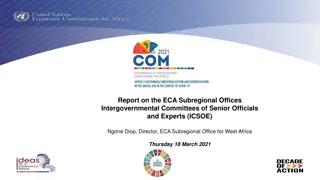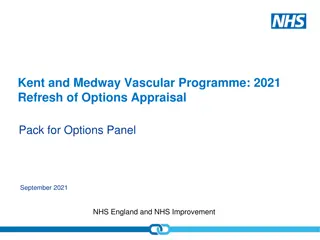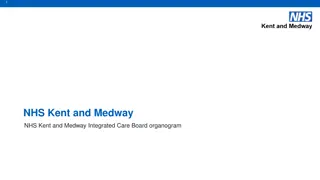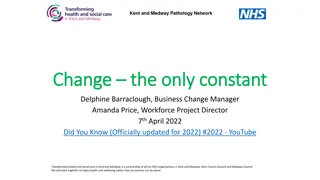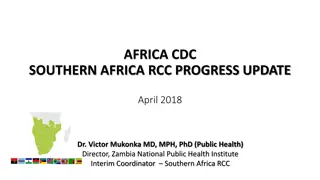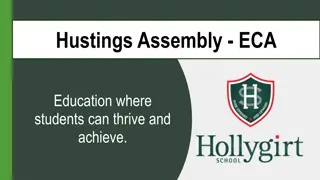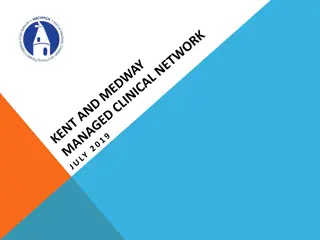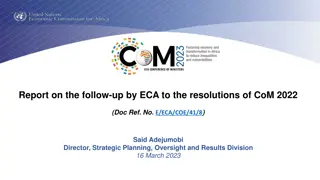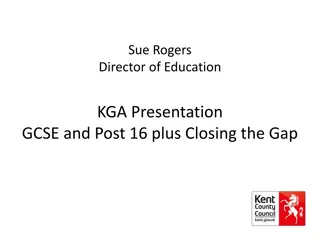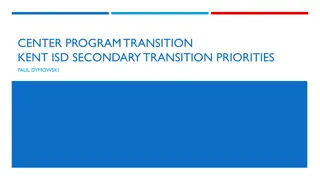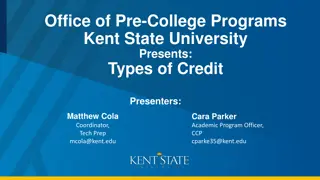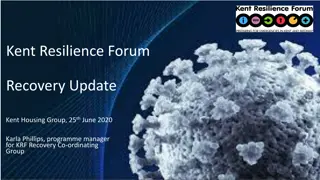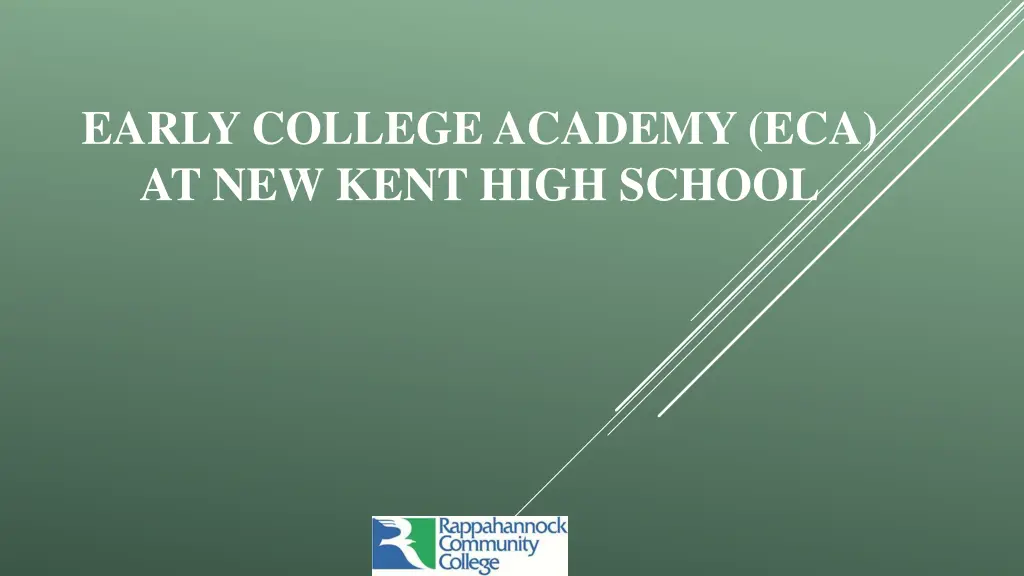
ECA Curriculum at New Kent High School
"Explore the ECA curriculum at New Kent High School, encompassing dual enrollment opportunities with Rappahannock Community College, program goals, benefits, and advantages. Prepare for a seamless transition to higher education while earning college credits in high school."
Download Presentation

Please find below an Image/Link to download the presentation.
The content on the website is provided AS IS for your information and personal use only. It may not be sold, licensed, or shared on other websites without obtaining consent from the author. If you encounter any issues during the download, it is possible that the publisher has removed the file from their server.
You are allowed to download the files provided on this website for personal or commercial use, subject to the condition that they are used lawfully. All files are the property of their respective owners.
The content on the website is provided AS IS for your information and personal use only. It may not be sold, licensed, or shared on other websites without obtaining consent from the author.
E N D
Presentation Transcript
EARLY COLLEGE ACADEMY (ECA) AT NEW KENT HIGH SCHOOL
RCC CAMPUSES AND OFF-CAMPUS SITES Warsaw Campus 804-333-6700 Glenns Campus 804-758-6700 Kilmarnock Site - Workforce Center - 804-435-8970 King George Site 540-775-0087 New Kent Site 804-557-2959
What are the benefits of starting at Rappahannock Community College? RCC allows you to complete their first two years of college, typically general education courses. RCC has small classes and opportunities to develop relationships with instructors and advisors. RCC saves time and money. RCC courses are transferable to four-year colleges and universities. RCC offers degrees, certificates, career study certificates and workforce training.
What are the advantages of taking dual enrollment (DE) courses in high school? You are both an NKHS student and dual enrolled as well, earning RCC credit at the same time as high school credit. DE saves you time and money. DE may shorten the time to your college degree completion. DE gives you early exposure to the academic rigors of a college-level course. DE courses are taught at the college level. You can transfer applicable college credit to most 4-year colleges and universities in Virginia (check the VCCS Transfer Guide on the universities websites).
What are the program goals of the ECA? To introduce you to the experience of real college courses in the supportive environment of high school; To encourage you to attend college by creating a seamless transition from high school to university study; To provide an opportunity for you to earn up to an Associate of Arts and Sciences degree at very low cost; To instill and develop the habits of mind necessary for success in higher education and the workplace; To provide options and the gift of time at university after high school graduation.
ECA Curriculum Grade 11 - Spring Summer Session - RCC Summer Session - RCC Grade 11 - Fall Grade 12 - Fall Grade 12 - Spring SDV 100 College Success Skills (1 Credit) Math 154 DE Quantitative Reasoning (3 Credits) Math 245 DE Statistics (3 Credits) Health or PE (1 or 2 Credits) General Elective (3 credits) or Math 167 DE Pre-Cal w/ Trig (5 credits) DE English 251 World Literature I (3 Credits) Alternate Days General Elective (3 credits) or Math 263 DE Calculus (4 Credits) DE English 210 Advanced Composition (3 Credits) Alternate Days ITE 119 Information Literacy (3 Credits) DE English 111 Alternate Days DE College Composition 1 (3 Credits) DE English 112 Alternate Days DE College Composition II (3 Credits) Humanities (3 Credits) AP US History - Alternate Days (Full Year) (6 Credits - must earn 3 or better on AP Exam) AP Government - Alternate Days (Full Year) (3 Credits - must earn 3 or better on AP Exam) Economics/ Personal Finance AP Biology or AP Chemistry -- Alternate Days (Full Year) (8 Credits - must earn 3 or better on AP Exam) AP Biology or AP Chemistry -- Alternate Days (Full Year) (8 Credits - must earn 3 or better on AP Exam) or two General Electives (6 credits) or one General Elective (3 credit) and AP Psychology (3 credit - must earn 3 or better on AP Exam) 6 or 8 Credits 15-18 Credits 4 Credits 6 Credits 20 Credits 4 or 5 Credits
What habits of mind are instilled in the ECA? Creativity Curiosity Engagement Flexibility Metacognition (Reflection on Your Own Thinking) Openness Persistence Responsibility
How can you use the Gift of Time after graduation from high school? Pursue a double major, because you will have the time to pursue the extra credits and requirements of a second major within a four-year span. Complete a combined Bachelors/Masters program in four years that would normally require five or six years. Take fewer than fifteen credits per term, leaving extra time for part-time (pre- professional) work, intercollegiate athletics, extracurricular activities, student government, study-abroad options, internships, etc. Use summers normally spent catching up on credits to work and earn money. Graduate early and move into the workforce a year or so earlier than your peers.
Why should you consider the ECA? You will gain valuable experience about the behaviors and attitudes necessary to be successful in a university setting. You can try on the role of a college student in the same way that pre- professionals try on the role of the professional through an internship. You enjoy the freedom to experiment in the role of the college student in a support-rich environment. You have a network of supportive professionals from both the college and the local high school to help you navigate this role well.
Steps to the ECA Apply for admission to ECA by: Discussing it with your HS Counselor and RCC HS Navigator Completing an ECA Application Completing a Dual Enrollment Application for RCC Earning Qualifying scores with Virginia Placement Test, PSAT, SAT or ACT
CONTACT INFORMATION Mr. Hutt Williams Coordinator of Dual Enrollment High School Career Coach Supervisor 804-333-6744 hwilliams@rappahannock.edu or deadvisor@rappahannock.edu https://www.rappahannock.edu/academics/dual-enrollment Dr. Miles McCrimmon Dean of Strategic Enrollment Management 804-333-6752 mmccrimmon@rappahannock.edu


